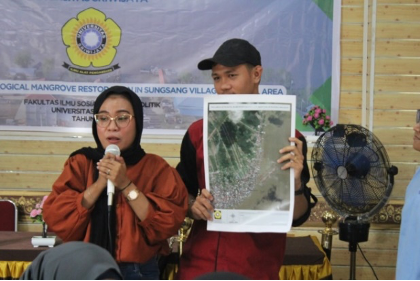Main Article Content
Abstract
Mangrove planting has been widely recognized as an effective strategy for coastal environmental conservation. However, the success of mangrove planting programs depends not only on technical aspects but also on the active participation and understanding of local communities. The community service method used in this study was socialization. The results of this program showed that 50% of participants were very satisfied, creating a sustainable relationship between coastal communities, the government, and Sriwijaya University in efforts to maintain mangrove sustainability for a better future. In addition, the planted mangrove trees are expected to become resistant to seawater abrasion and provide habitat for fauna that serve as a source of livelihood for local fishermen in the next 10 years.
Keywords
Article Details

This work is licensed under a Creative Commons Attribution-NonCommercial 4.0 International License.

